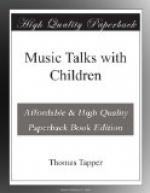I do not know that any one has likened music to a country. But we can make the comparison, and then it becomes plain that we may either wander through it, seeing the beautiful things, wondering about them, and talking over our admiration and our wonder; or we may join to this a true and an earnest inquiry, which shall give us, as a reward, the clear understanding of some things which we see. Let us travel in this way; first, because we shall gain true knowledge by it, but better still, because we shall thereby learn in the first days that the truest pleasures and the dearest happinesses are those for which we have done something; those for which we have given both of labor and of pains.
One of the wisest little philosophers in the world was Polissena,[5] and I think she became wise just because she labored. As we become more and more acquainted with true music we shall learn this: True music is that which is born in some one’s heart. “All immortal writers speak out of the heart."[6] Nothing could be truer; and as they speak out of their hearts you may be sure they intend to speak into ours. Nowhere else. As true music is made in some one’s heart, we must feel it in our own hearts as we play it or it will mean nothing. The heart must make it warm, then the beauties of the music will come out. It is strange how our moods tell themselves. All we do with our eyes and with our ears, with the tongue and with the hands, what we do with our thoughts even, is sure to say of itself whether we are doing with a willing heart or not. It is curious that the truth will come out of whatever seems to be a secret, but curious as it may be, it does come out. We must think of that.
Every one of us knows the difference between doing willingly and unwillingly. We know that things done with joy and with eagerness are well done and seem to spring directly from the heart. Not only that, but they really inspire joy and eagerness in those who are about us. Inspire is just the word. Look it up in your dictionary and see that it means exactly what happens—to breathe into—they breathe joy and happiness into all things else, and it comes out of our hearts.
Now happiness can be told in many ways: in laughter, in the eyes, in a game, in a life like that of Polissena’s, in anything, but in nothing that does not win the heart. As happiness can be shown in anything, it can be shown in music. We can put happiness into play, likewise we can put happiness into music. And as much of it as we put into anything will come out. Besides, we might just as well learn now as at another time, this: Whatever we put into what we do will come out. It may be happiness or idleness or hatred or courage; whatever goes into what we do comes out very plainly. Everything, remember. That means much. If you should practise for an hour, wishing all the time to be doing something else, you may be sure that your wish is coming out of your playing so plainly that every one knows it. Do you think that is strange? Well, it may be, but it is strictly true.




